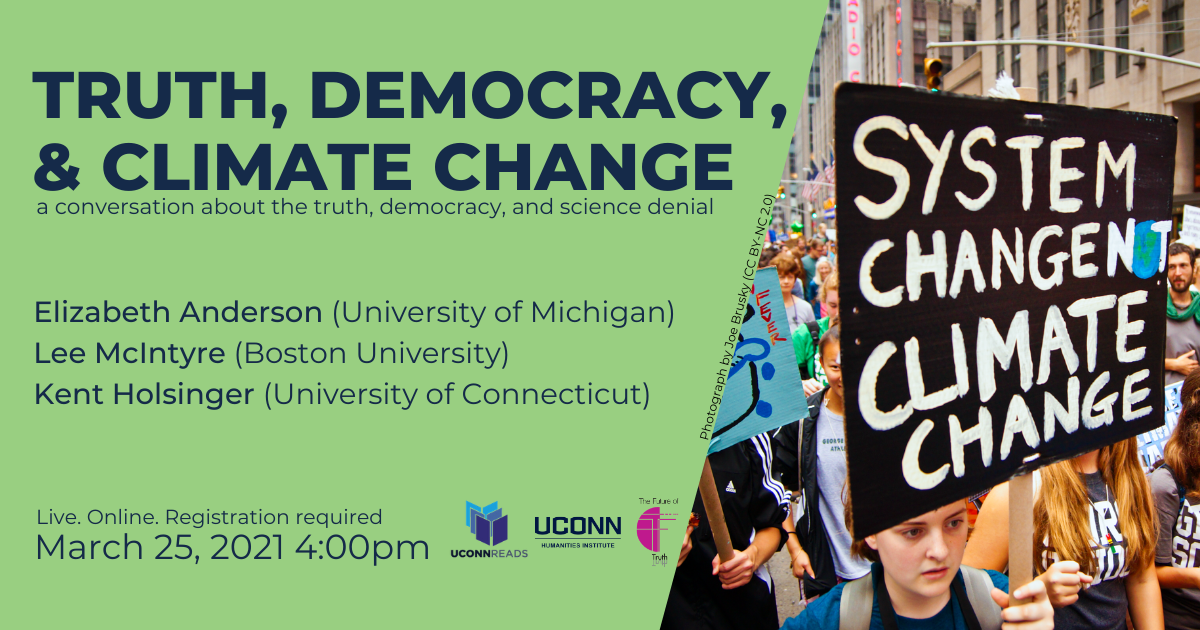Truth, Democracy, and Climate Change
March 25, 2021, 4:00pm. An online panel discussion. Registration required.
Join this panel discussion on truth, democracy, and climate change, part of the UConn Reads program which focuses on The Great Derangement: Climate Change and the Unthinkable (University of Chicago, 2016) by Amitav Ghosh.
The climate crisis facing our society isn’t only an environmental crisis; it is also an urgent political and epistemological problem.
For decades, climate scientists have been warning that greenhouse gas emissions are changing the climate, destroying biodiversity, and threatening human health. By this point, the evidence is overwhelming and the scientific consensus well-documented.
Still, significant segments of the public (especially in Anglophone countries) remain unconvinced, with positions on climate change polarized along partisan lines. Denialism – usually defined as the employment of rhetorical tactics to give the appearance of legitimate debate about a question the relevant community of experts regards as settled – persists in many quarters and effectively dominates one of two major American political parties. Evidently, warning the public about climate change is one thing; getting people to accept it is another; and translating popular acceptance into effective government policy a further matter still.
Why do so many people, in the face of so much scientific evidence and expert consensus, remain so staunchly unconvinced? How can science advocates persuade skeptics to take action? What should liberal democratic societies do about polarization and anti-science propaganda? And what is the proper role for science in a democratic society?
Join us for a discussion of the political and epistemological dimensions of science denial with eminent scholars.
The panel is organized by Thomas Bontly (Associate Professor of Philosophy, University of Connecticut), who’ll be moderating. Bontly’s research centers on several interrelated issues: the nature of mind, the basis of meaning, and the multifarious relations between both of these and the physical. His research interests also include various topics in metaphysics (especially the nature of causation), epistemology, metaphilosophy, the philosophy of biology, and environmental ethics.
The Panelists
Elizabeth Anderson is John Dewey Distinguished University Professor, John Rawls Collegiate Professor, and Arthur F. Thurnau Professor at the University of Michigan. She is the author of Value in Ethics and Economics, The Imperative of Integration, and, most recently, Private Government: How Employers Rule Our Lives (And Why We Don’t Talk About It), as well as articles on value theory, the ethical limitations of markets, facts and values in social scientific research, feminist and social epistemology, racial integration and affirmative action, rational choice and social norms, democratic theory, egalitarianism, and the history of ethics (focusing on Kant, Mill, and Dewey).
Kent Holsinger is Board of Trustees Distinguished Professor, Vice Provost for Graduate Education, and Dean of The Graduate School at the University of Connecticut. His research focuses on the evolution and genetics of plants. He has studied the evolution of plant mating systems; explored how basic principles of ecology, evolutionary biology, and systematics should influence conservation decisions; and developed statistical methods for analyzing genetic diversity in spatially structured populations.
Lee McIntyre is a Research Fellow at the Center for Philosophy and History of Science at Boston University and a Lecturer in Ethics at Harvard Extension School. He is the author of Post-Truth (MIT Press, 2018), The Scientific Attitude (MIT Press, 2019), and many other books, as well as numerous popular essays that have appeared in The New York Times, Newsweek, Scientific American, The Chronicle of Higher Education, The New Statesman, and The Times Higher Education Supplement. His new book How to Talk to a Science Denier—which is based on first-hand conversations with Flat Earthers, climate deniers, and others—will be published by MIT Press this summer.
Registration is required for the event.
If you require accommodation to attend this event, please contact us at uchi@uconn.edu or by phone (860) 486-9057.
Watch now:


